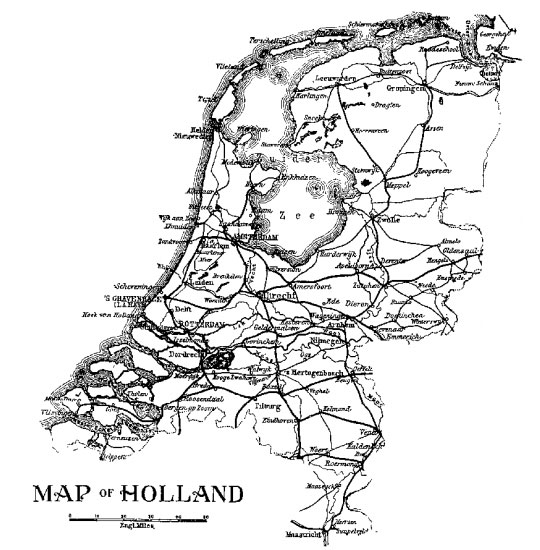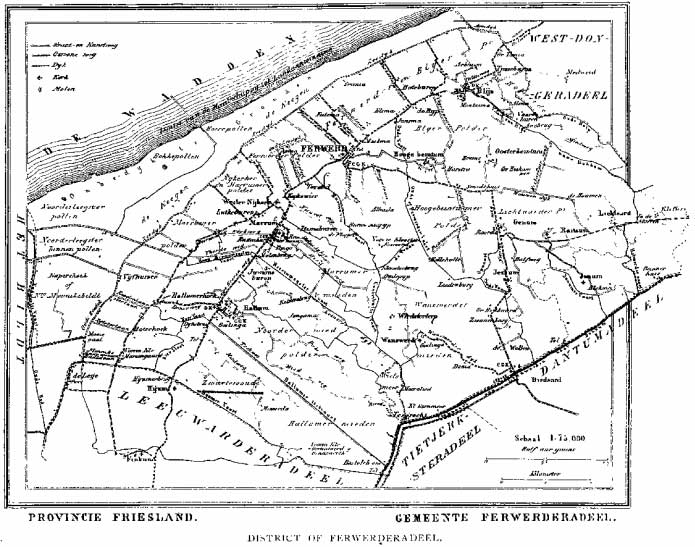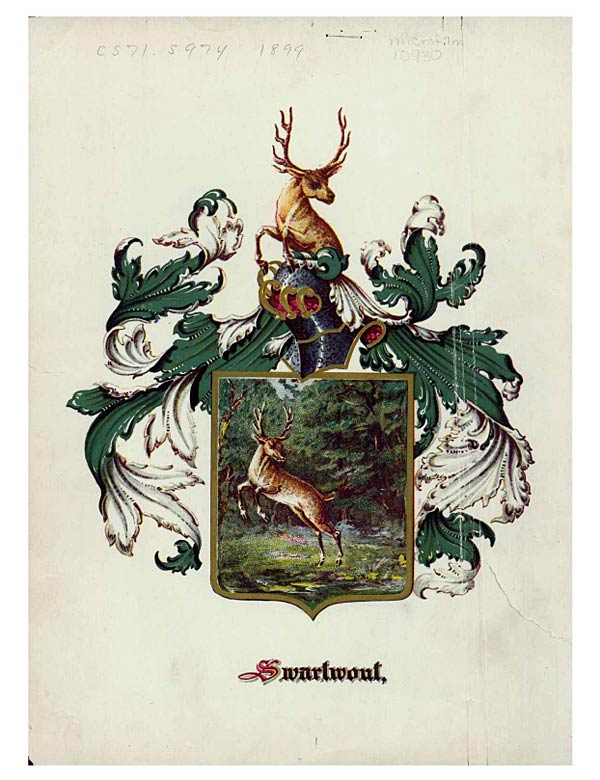Excerpts including origins of the family name, Swartwout…
In the first ages of the world people were distinguished by names descriptive of their origin, appearance, traits of character, and by titles derived from imputed blessings of the Diety : Adam (red earth), Cain (gotten from the Lord), Laban (white), Esau (hairy), Jacob (supplanter), Solomon (peaceful), Jonathan (gift of Jehovah), Nehemiah (comfort of the Lord). Later such appellations were frequently bestowed without any consideration of their signification being accepted as denoting the individual’s derivation, features, disposition, or attributes.
Surnames are so called because they were originally written above those first designating mankind. They were then used to denote the vocations, localities of residence, rank, or kinship of the persons bearing them: Faber (Latin, smith), Zimmerman (German, carpenter), Clinton (Dano-Norman, promontory-town), Amherst (Saxon, woodland-village), Sigsby (Anglo-Saxon, town of victory), Prescott (English, priest’s cottage), Luther (German, renowned chief), Johnson (English, son of John). In England and France surnames became hereditary about the eleventh century. As family titles they have been perpetuated mainly by records of sale and purchase of property, by wills, and other instruments of writing.
In the middle ages the names of the seats of ancestral estates began also to be used to designate the families possessing them. The appellation Black-wood, derived from a forest-covered demesne in Scotland, has long been the title of a well-known family living in that part of Great Britain. Six centuries ago the synonymous cognomen Swartwout (Blackwood) similarly originated from a densely-wooded manor lying in that part of Frisia or Northern Holland, now known as the district of Ferwerderadeel, in the province of Friesland. A primeval forest, figuratively styled by the inhabitants het Zwartewoude (the Black Forest), then stretched across that part of the Netherlands, north of the city of Leeuwardcn. Now only a few scattered groves diversify the level landscape where formerly the vast wood was imposingly conspicuous. The westward range of this dark forest is still indicated on maps of the province by its early geographical title, Zwartewoude.

Swartwout Chronicles, Chapter 01, Page 2
(n.b. Zwarte, also written swarte, a Dutch adjective, meaning black, and agreeing with the neuter substantive woude, also written wout, of the same language, signifying a wood or forest. There is also a Dutch noun, hout, expressing wood or timber as material. The Dutch words woud and hout are closely allied in meaning to the German terms wold or wald, and holt or holz.
Zwartevoude or Zwartewold, the present tract of land bearing that name, is described as lying in the canton of Holwerd, arrondissement of Leeuwarden, districtof Ferwerderadeel, quarter of Oostergoo, in the province of Friesland, bordering northwest on the highway from Hallum to Hallum, northeast on the Hallum canal, southeast on the Hallum meadows, and southwest on the Hallum lake, and having an area of five English acres and certain fractions of an acre. (“Zwartewoude of Zwartewold, streek lands, prov. Friesland, kw. Oostergoo, griet. Ferwerderadeel, arr. Lceuwarden, kant. Holwerd; palende N. W. aan den rijweg van Hijum naar Hallum, N. O. aan dc Hallumervaart, Z. O. aan de Hallumermieden, en Z. W. aan het Hijumermeer, en eene oppervlakte beslaande van 5 bund. 65 v. r. 50 v. ell.”))

Swartwout Chronicles, Chapter 01, Page 03
The ensigns armorial or coat-of-arms of the Frisian Swartwouts emblematically represent not only the woody locality of the patrial manor, but also the political freedom which they originally enjoyed as possessors of the extensive estate of Zwartewoude. The right of emblazoning on their war-shields the proper figure of an alert deer bounding across a grassy glade of a dark forest was granted the male members of the family, by royal decree, in the thirteenth century. (n.b. Ecusson: un ccrf sauiant guardant dans line clairere d’une foret noire. Citnier: la tete d’un cerf guardant. Lambrequin: de sinople et d’argent . Vide: Frontispiece.) The inspiring augury, contained in an ancient statute-book of the country, that its inhabitants should be “free as long as the wind blows out of the clouds and the earth remains,” they intrepidly sought to verify by the might of their weighty swords in frequent engagements with foreign invaders, who again and again attempted to put them under subjection.
The Frisians, originally a Germanic race, were already occupying the northern territory of Belgic Gaul when Julius Caesar, in the year 57 8.C., invaded it. They were then far advanced in successful methods of agriculture, and so rich in cattle that they were required by the Romans to pay a heavy tribute in hides and horns. Their fair complexions, bright blue eyes, heavy locks of auburn hair, great stature, and physical vigor, constantly commanded the admiration of the Latin invaders. The men, clad in plainly -made woolen tunics and loosely-fitting breeches, and the women, as simply attired, were so grand in character that they quickly won the respect of the Roman soldiery.
The people of Frisia recognized the existence of God, in whose divine fatherhood they discovered care and guidance, and whom they worshipped in consecrated forests on appointed days. They had no priests and offered no sacrifices. They hallowed marriage; each man exclusively honoring with his affection and fortune the woman chosen for his wife.
The frequent incursions of foreign forces, led by ambitious and depraved commanders seeking to dispossess the inhabitants of Frisia of their property and independence, gradually distempered their minds and morally debased their offspring. It happened in the year 728 that Archbishop Wolfram, of Sens, in Gaul, under the sanction of Charles Martel, or Charles the Hammer, undertook the conversion of the people of Friesland to Christianity. Among those who were willing to be baptized in evidence of their acceptance of the religious teachings of the zealous dignitary was Radbod, a dethroned Frisian king. While waiting to receive the outward sign confirmatory of his faith, his thoughts reverted to his deceased pagan ancestors. “Are they in heaven or hell?” he asked. “In hell,” the pious prelate answered. “Then I would rather dwell hereafter with my kindred there than with a few strange Christians in heaven,” he frankly declared, and forthwith strode away from the surprised archbishop.
Poppo, the son of Radbod, who succeeded him in governing Friesland, was killed in 750 in a battle with Charles the Hammer, who established at Utrecht the famous episcopate of which Saint Willebrordus was the first…
CONTINUED: Chapter 01 pp 5-8 Frisian Ancestors
